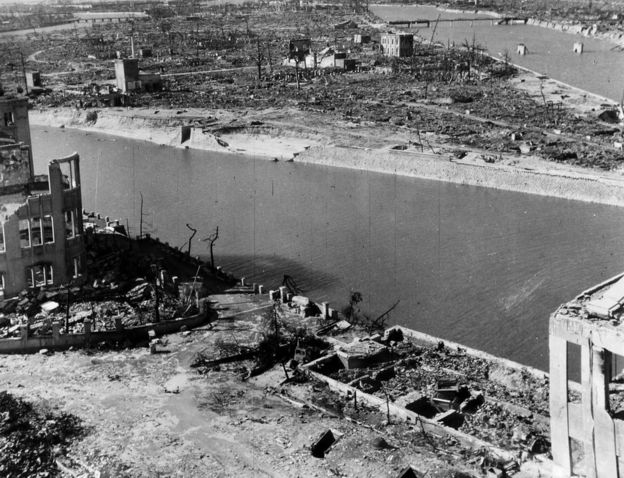North Korea: the case for preventive war
Posted By Kevin R. James on October 26, 2017 @ 06:00

The US national security adviser, General H.R. McMaster, recently stated [1] that the president is ‘not going to accept [North Korea] threatening the United States with a nuclear weapon … There are those who have said, “What about accept and deter?” Well, accept and deter is unacceptable.’ So, unless the North Koreans choose to freeze their nuclear program—and the evidence overwhelmingly indicates that they won’t [2]—then the implication of McMaster’s position is that the US will (soon) launch a preventive war to eliminate the North Korean nuclear threat.
This position creates a puzzle. According to the virtually [3] uniform [4] view [5] of [6] the foreign-policy community, ‘accept and deter’ will accomplish the goal of preventing North Korea from using nuclear weapons at almost no risk, while preventive war entails considerable risks [7]. Consequently, it would seem to be utterly daft [8] to even have the preventive war option on the table, let alone to be seriously considering it. What’s going on?
What McMaster knows, and what the foreign policy community effectively ignores, is that the US is not in fact choosing between deterrence and war. Thinking through how deterrence actually works in light of the Cold War reveals that any effort to deter North Korea faces a significant chance of failure (even assuming that the North Koreans are fully rational). It follows that the US is actually choosing between deterrence with the chance of an accidental nuclear war later or preventive war now. The optimal policy choice therefore turns on the relative risk of the two options. So, how risky is deterrence?
The logic of deterrence requires that your nuclear-armed opponent have the capability to retaliate in response to a true alarm that you are attacking them. Unfortunately, that capability necessarily creates the possibility that your opponent might launch a first strike at you by mistake in response to a false alarm. The history of the Cold War shows beyond any possible doubt [9] that military misunderstandings, human error and technical malfunctions will generate false alarms of an enemy attack and that those false alarms can easily lead to accidental nuclear war [10]. Indeed, using engineering methods designed to examine system-failure probabilities, Barrett, Baum and Hostetler [11] put the probability of a US–Soviet deterrence failure leading to accidental nuclear war at around 2% per year.
The history of accidental-nuclear-war near misses suggests that the probability of a deterrence failure increases with political tensions, decision-making time pressure, and rigid decision-making processes.
Political tensions increase the risk of deterrence failure because attack alarms that could be dismissed out of hand during calm times must instead be treated as possibly true, and anytime an alarm is vetted an error could occur (think of the Cuban missile crisis). North Korea has a long history of engaging in highly provocative behaviour, and nuclear weapons will only increase its incentives to act in that way [12]. We can therefore be certain that US–North Korean relations will generally be extremely tense.
Vetting attack alarms requires time (is the alarm true or the result of a technical malfunction?). Yet, North Korea is a small country on the ocean adjacent to the US Navy and US allies. The officers in North Korea’s nuclear command-and-control chain will inevitably have very little time to evaluate attack alarms (much less time than the Soviets).
Accurately vetting alarms requires that command-and-control officers exercise (in the words of a recent Chatham House report) independent and ‘prudent judgement, which might involve disobeying previous orders’ [10] to figure out what’s really going on. Studies of human error in the context of airplane crashes [13] show that people from cultures that have a more collectivist orientation and that are more uncertainty-averse tend to deal with complex and stressful situations by following rules and avoiding independent judgements (and so are more likely to crash planes). South Korean culture is among the most highly collectivist and uncertainty-averse in the world [14], and it’s safe to assume that North Korean military culture will be even more extreme along these dimensions. To be sure, Kim Jong-un could take active steps to counter these cultural tendencies. But, given that the biggest threat to Kim’s regime is a military coup, the very last thing that he will instil in his officer corps is an ethos that emphasises independent judgement. In short, the North Korean officer corps will be spectacularly ill-suited to exercise the prudent judgement that avoiding accidental nuclear war requires.
The political tension, time and prudent judgement factors therefore all indicate that the probability of a US–North Korean deterrence failure will be even higher than was the already terrifyingly high 2% chance per year (or 25% chance per 15 years) of a US–Soviet deterrence failure.
So, is a preventive war now better than a 25% (or higher) chance of an accidental nuclear war with North Korea sometime in the next 15 years? Given that North Korea doesn’t yet but will very soon have the capability to mount hydrogen bombs on ICBMs and use those weapons to attack the US mainland and US allies, the answer to that question is obviously ‘Yes’. Consequently, the best option the US has to deal with North Korea’s nuclear threat is to eradicate the Kim regime by means of a preventive war—and to do it now.
Article printed from The Strategist: https://www.aspistrategist.org.au
URL to article: https://www.aspistrategist.org.au/north-korea-the-case-for-preventive-war/
URLs in this post:
[1] recently stated: https://qz.com/1107662/hr-mcmaster-is-making-war-with-north-korea-sound-inevitable/
[2] they won’t: https://www.thecipherbrief.com/column_article/best-of-realism-and-north-korea
[3] virtually: https://www.nytimes.com/2017/08/10/opinion/susan-rice-trump-north-korea.html?_r=0
[4] uniform: https://www.foreignaffairs.com/articles/north-korea/2017-09-10/korean-missile-crisis
[5] view: https://warontherocks.com/2017/10/a-new-strategy-for-deterrence-and-rollback-with-north-korea/
[6] of: https://warontherocks.com/2017/10/deadly-overconfidence-trump-thinks-missile-defenses-work-against-north-korea-and-that-should-scare-you/
[7] considerable risks: https://warontherocks.com/2017/10/the-growing-danger-of-a-u-s-nuclear-first-strike-on-north-korea/
[8] utterly daft: https://www.foreignaffairs.com/articles/north-korea/2017-08-22/take-preventive-war-north-korea-table
[9] beyond any possible doubt: http://www.unidir.org/files/publications/pdfs/understanding-nuclear-weapon-risks-en-676.pdf
[10] accidental nuclear war: https://www.chathamhouse.org/sites/files/chathamhouse/field/field_document/20140428TooCloseforComfortNuclearUseLewisWilliamsPelopidasAghlani.pdf
[11] Barrett, Baum and Hostetler: http://sethbaum.com/ac/2013_NuclearWar.pdf
[12] that way: https://www.cfr.org/report/sharper-choice-north-korea
[13] the context of airplane crashes: http://www.tandfonline.com/doi/abs/10.1207/S15327108IJAP1002_1
[14] South Korean culture is among the most highly collectivist and uncertainty-averse in the world: https://geert-hofstede.com/south-korea.html
Click here to print.